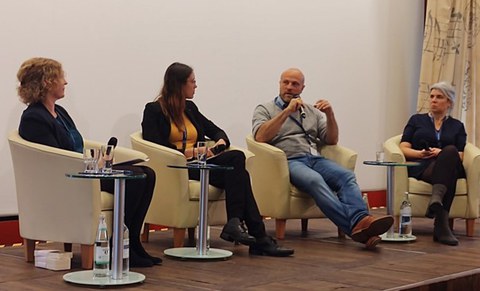Realizing Sustainable Development post-2030: The International Politics, Economics and Law of Clean Water & Sanitation (SDG6)
Jochen Kleinschmidt & Christian Leßmann
TU Dresden’s Center for International Studies (ZIS) celebrated its 25th anniversary with a series of events which included presentations by political and civic leaders, awards ceremonies, as well as an interdisciplinary conference on the international politics, economics and law of clean water and sanitation—in other words, on the international aspects of Sustainable Development Goal 6 (“Clear water and sanitation”). In accordance with the structure of ZIS, the contributions to the conference were grouped into International Economics, International Relations, and International Law panels.
The panel on the economic and environmental agenda, chaired by Prof. Christian Leßmann, focused on water as a scarce resource. Krisztina Kis-Katos (University of Göttingen) gave an impulse presentation on a research project on water and social conflict. The project facilitates georeferenced data and demonstrates a significant positive effect of water scarcity on the risk of conflict on a global scale. Markus Ludwig (TU Braunschweig) took a national perspective by presenting a study on salinization in Vietnam. With dam construction and reduced rainfall upstream of the Mekong, the salt concentration in the Mekong delta increases and reduces agricultural productivity. Farmers, therefore, invest more in the education of children to allow them to find jobs in modern sectors. Ines Dombrowsky (IDOS) reported on a local project on groundwater use in Azraq, Jordan. Using a network of actions approach, the study shows that many stakeholders are involved in water use; therefore, it is challenging to identify promising intervention points. Corruption and weak governance are a severe threat.

Professor Anna Holzscheiter engaged in discussion with Professor Lena Partzsch, Professor Manuel Fischer, and Larika Waldmann.
The panel “The Political Determinants of SDG 6: Water (Access) Governance and Policy Solutions at the Intersection of Environment, Security and Health”, chaired by Professor Anna Holzscheiter, addressed access to safe water as a highly complex policy issue at the intersection of environment, security and health. Lena Partzsch, Professor of Comparative Politics at FU Berlin, discussed the problematique of political accountability for insufficient action on SDG6. Manuel Fischer, Research Group Leader at the Department of Environmental Social Sciences at Eawag and Adjunct Professor at the Institute of Political Science, University of Bern, Switzerland, gave a presentation on the complex cross-sectoral challenges in water governance. And Larika Waldmann, Advisor for International Programs at German Water Partnership, presented the activities of her organization, which aims to provide development cooperation solutions for example regarding industrial water management, water and energy, and other complex issues in water policy. A strand that ran through the debate were the potentially critical effects of replacing the language of rights to water by the more technical term of access.
The international law panel “The Impact of the Right to Water and Sanitation to Realize Sustainable Development”, chaired by Professor Dominik Steiger, explored ways and means to promote the right to water in public international law and implement it as part of worldwide sustainable development for the benefit of all. Presentations were given by Professor Dirk Hanschel, Chair for German, European and International Public Law at Martin-Luther-Universität Halle-Wittenberg and Principal Investigator of the DFG Project “Water Indicators in Domestic Politics and Law” (WIDPAL), and Professor Pedro Arrojo-Agudo, Special Rapporteur on the Right to Water and Sanitation for the United Nations. The contributions to this panel demonstrated a discrepancy between codified international legal norms regarding the right to water and the concrete contexts in which these norms are applied and potentially instrumentalized by different actors on the ground. The lively discussion that ensued also covered norm collisions between the right to water and, for example, states’ rights to self-defense, as currently experienced in the Middle East.
By analyzing the intellectual and practical challenges of a complex global issue from the perspectives of three academic disciplines, the ZIS celebratory conference thus demonstrated both the success of its interdisciplinary approach to international studies and its strong connections to international academic and policy expertise.